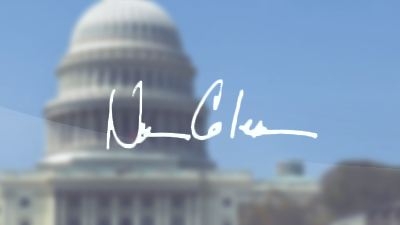Notes from Norm: The Senate Is Back
In 2010, the American people gave control of the U.S. House of Representatives to the GOP after four years of a political monopoly for Democrats in Washington, D.C.
In 2014, Republicans gained a historic majority in the U.S. House of Representatives, and delivered the President and Harry Reid a staggering rebuke by giving Republicans a solid majority in the United States Senate.
Barely 24 hours later the President, angry and bitter at his political fortunes, conveyed to the American people that whatever message they intended to be sent to him obviously had been delivered to the wrong address.
In his mind the election had absolutely nothing to do with him yet exit polls (and defeated members of his own party) said it had absolutely everything to do with him and his policies.
Since that time the President has doubled down on his intention to govern outside of the confines of the Constitution, invoking his right to implement policies or ignore them on the tenuous platform of Executive Privilege.
Which is why the emergence of the Mitch McConnell Senate makes a difference to America.
If Mitch McConnell’s first 100 days are any sign of the future, it is a good one for America.
Former Senate Majority Leader Harry Reid rendered the U.S. Senate an ineffectual and shallow shell of its former self during his tenure.
Mitch McConnell promised to make the Senate work again and the proof of that promise is already taking root in the productivity of the world’s most deliberative body.
While the U.S. House passed bill after bill to help the economy, support small business, expand job creation and secure control over our fiscal house, all bills came to a dead stop in the Senate.
But so much has changed in so little time.
Today, Congress is actually working. It’s getting things done. It’s having hearings. Passing bills. Being heard.
And, it’s being bipartisan.
Negotiations over how Congress should be playing a role in the agreement the President reached with Iran was not a “my way or the highway” debate between partisans.
It was a serious, considered discussion between Democrats and Republicans in the U.S. Senate about what type of legislation should be passed to ensure the President was able to negotiate freely, but that Congress would be heard equally, on the most critical foreign policy issue of our lifetime: Iran’s capacity to build a nuclear weapon.
Under Harry Reid there would have been no bill. There would have been no debate. There would be no bipartisanship.
In fact, under Harry Reid the majority of his own caucus would have been muffled and deprived of a voice.
That a compromise bill was achieved is certainly a credit to Senator Bob Corker and Senator Ben Cardin, but without Mitch McConnell giving members the runway to negotiate at all, there would be no agreement.
Important bipartisan reforms on “No Child Left Behind” are a testament to the legislative skills of Senator Lamar Alexander and Patty Murray, but that they happened at all, and that they will ultimately be passed into law, happens because Mitch McConnell wants reform to be a key part of his.
There was also the bipartisan vote in the Senate that approved a Medicare reform bill that provides a permanent solution to the “doc fix” and ensures payments to Medicare providers will keep up with inflation.
The Mitch McConnell Senate is a different place today than the Harry Reid Senate. The Senate today is a place where members on both sides of the aisle aren’t afraid to talk about how they can come together to get things done.
The Senate has held over 100 votes since Mitch McConnell became Majority Leader this year.
In fact, the Mitch McConnell led Senate had voted on more amendments in one week when it came to power than the Harry Reid cntrolled Senate considered in all of 2014.
In 2014, under Harry Reid, the Senate had a total of 14 votes the entire year.
This year, for the first time in six years, the United States Senate passed a budget bill.
The Senate is working again.
Which isn’t to say there won’t be partisan differences, because there are, and there always has been, and there always will be.
The President is angry because the Senate GOP won’t hurry up and approve his nominees quickly enough to suit his desires. That the President and Democrats led by Harry Reid choose to change the rules of the Senate to run amok over the rights of the then Republican minority is a price they are now paying for their unprecedented power grab.
But, partisan differences are not, nor should they be, an automatic death sentence to finding common ground and moving the country forward.
Great differences remain on fiscal policy, ObamaCare, foreign policy and a host of many other issues.
Despite those differences, and often because of those differences, Mitch McConnell has moved the Senate back to a time and place where the body has a role in determining the direction of the country.
The Mitch McConnell Senate stands in stark contrast to the limitless partisanship of Harry Reid.
Where legislation and ideas and bipartisanship languished and died, is now a political body that is finding its way to moving the country forward.
The U.S. Senate is back.


